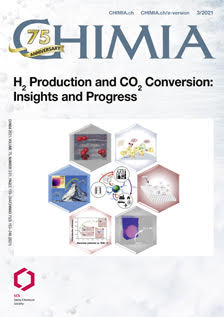How ab initio Molecular Dynamics Can Change the Understanding on Transition Metal Catalysed Water Oxidation
DOI:
https://doi.org/10.2533/chimia.2021.195PMID:
33766202Keywords:
Density functional theory, Enhanced sampling, Molecular dynamics, Transition metal catalysis, Water oxidationAbstract
Artificial water splitting is a promising technology that allows the storage of renewable energy in the form of energy-rich compounds. This mini-review showcases how theoretical studies contribute to the under-standing of existing water oxidation catalysts (WOCs) as well as inspiring the development of novel WOCs. In order to understand the chemical complexity of transition metal complexes and their interaction with the solvent environment, the use of sophisticated simulation protocols is necessary. As an illustration, a family of ruthe- nium-based WOCs is presented which were investigated employing a wide range of forefront computational methods with emphasis on ab initiomolecular dynamic based approaches. In those studies a base assisted oxygen–oxygen bond formation was identified as the energetically most favourable reaction mechanism. By examining the role of local environmental effects at ambient temperature and the effect of modifications in the ligand framework, a comprehensible picture of the WOCs can be given, where the latter can serve as a guideline for further experimental and computational studies. In this mini-review, we provide a description of the methods, and the findings of our previous computational studies in compacted form, aimed at scientists with a theoretical as well as experimental background.Downloads
Published
2021-03-31
Issue
Section
Scientific Articles
License
Copyright (c) 2021 Mauro Schilling, Rangsiman Ketkaew, Sandra Luber

This work is licensed under a Creative Commons Attribution 4.0 International License.
How to Cite
[1]
M. Schilling, R. Ketkaew, S. Luber, Chimia 2021, 75, 195, DOI: 10.2533/chimia.2021.195.







